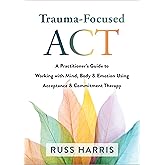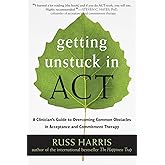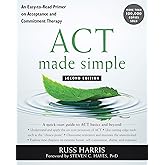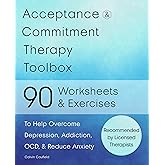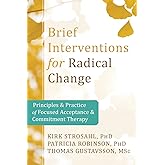These promotions will be applied to this item:
Some promotions may be combined; others are not eligible to be combined with other offers. For details, please see the Terms & Conditions associated with these promotions.
Your memberships & subscriptions

Download the free Kindle app and start reading Kindle books instantly on your smartphone, tablet or computer—no Kindle device required.
Read instantly on your browser with Kindle for Web.
Using your mobile phone camera, scan the code below and download the Kindle app.

Follow the author
OK
ACT for Depression: A Clinician's Guide to Using Acceptance and Commitment Therapy in Treating Depression Kindle Edition
Psychological research suggests that cognitive behavior therapy (CBT), used alone or in combination with medical therapy, is the most effective treatment for depression. Recent finding, though, suggest that CBT for depression may work through different processes than we had previously suspected. The stated goal of therapeutic work in CBT is the challenging and restructuring of irrational thoughts that can lead to feelings of depression. But the results of recent studies suggest that two other side effects of CBT may actually have a greater impact that thought restructuring on client progress: Distancing and decentering work that helps clients stop identifying with depression and behavior activation, a technique that helps him or her to reengage with naturally pleasurable and rewarding activities. These two components of conventional CBT are central in the treatment approach of the new acceptance and commitment therapy (ACT). This book develops the techniques of ACT into a session-by-session approach that therapists can use to treat clients suffering from depression.
The research-proven program outlined in ACT for Depression introduces therapists to the ACT model on theoretical and case-conceptual levels. Then it delves into the specifics of structuring interventions for clients with depression using the ACT method of acceptance and values-based behavior change. Written by one of the pioneering researchers into the effectiveness of ACT for the treatment of depression, this book is a much-needed professional resource for the tens of thousand of therapists who are becoming ever more interested in ACT.
Customers who read this book also read
Product description
Review
Having been present at the birth of ACT approximately thirty years ago, Zettle articulates ACT's basic principles with the ease and clarity that can only come from a seasoned veteran. The rationale and techniques for applying ACT to depression are sensitive, satisfying, and establish Zettle as a true expert on depression as well as a master clinician. The book succeeds at offering both a clear, concise articulation of ACT for depression in terms of core, functional processes, allowing clinicians to apply ACT flexibly and functionally as well as a session-by-session manual for clinicians to follow when the needs for structure and support are a priority. It is easy to read with out sacrificing the philosophical and theoretical complexity of the approach. I recommend it for novice and experienced ACT clinicians as well as other clinicians and clinical students wishing to add acceptance and commitment techniques to their clinical repertoires.
--Jonathan W. Kanter, Ph.D., assistant professor of psychology, director of the Depression Treatment Specialty Clinic, and coordinator of the University Psychology Clinic at the University of Wisconsin-Milwaukee
Depression is the number one mental health problem seen in clinical practice and any clinician interested in practicing acceptance and commitment therapy is going to want to have this book within easy reach. Zettle provides a well thought out, easy to understand approach to treating the depressed client using the ACT framework. Capitalizing on his many years of clinical experience using the ACT model, Zettle offers numerous practical insights into managing the ongoing process of therapy, and uses brief case examples to highlight key points. The session by session ACT protocol described in the second half of the book will be a fantastically useful aid to clinicians in the field.
--Kirk Strosahl Ph.D., coauthor of Acceptance and Commitment Therapy: An Experiential Approach to Behavior Change and A Practical Guide to Acceptance and Commitment Therapy
I enthusiastically endorse Zettle's ACT for Depression. Well-written and comprehensive, this text is a valuable addition to the ACT literature. Addressing one of the most widespread difficulties encountered in clinical practice, this resource details a robust treatment which will be well-received by practicing clinicians with both behavioral and non-behavioral backgrounds alike.
--R. Trent Codd, III, Ed.S., LPC, LCAS, president of the Cognitive-Behavioral Therapy Center of WNC, P.A., in Asheville, NC
This professional book is the first to outline the conceptual roots, empirical basis, and practical application of acceptance and commitment therapy (ACT) for unipolar depression. In a clear and accessible style, the author guides mental health professionals and students alike in the strategic application of ACT as a supplement or alternative approach to available treatments for depression. Readers learn how to integrate and use acceptance and mindfulness strategies with commitment and behavior change strategies to help depressed clients live better, not simply to feel better. The book includes several well-crafted examples, clinical dialogues, and practical exercises, and a step-by-step integration of the material into a twelve-session protocol. It is a vital clinical resource for professionals who are committed to helping restore the lives of those who are stuck and wallowing in depression and misery.
--John P. Forsyth, Ph.D., associate professor of psychology and faculty director of the Anxiety Disorders Research Program at the University at Albany, SUNY, and author of Acceptance and Commitment Therapy for Anxiety Disorders and ACT on Life Not on Anger
This book provides more than an excellent explication of applying ACT to depression. Zettle's presentation of the fundamental ACT principles and processes is so clear and comprehensive that readers will almost certainly see the potential application of them to many other forms of human suffering in addition to depression. I give this book my highest recommendation.
--Hank Robb, Ph.D., ABPP, past president of the American Board of Counseling Psychology and founding board member of SMART Recovery(TM)
This book is a masterful contribution to the literature on the psychological treatment of depression. In exquisite detail, and full of wonderful metaphors and moment-by-moment description of the process of therapy, it will become required reading for all therapists who seek to help people find a way through their struggles with depression.
--Prof. Mark Williams, professor of clinical psychology and Wellcome Principal Research Fellow at the University of Oxford, holding a joint appointment in the Departments of Psychiatry and Experimental Psychology
About the Author
Robert D. Zettle, Ph.D., is associate professor in the Department of Psychology at Wichita State University. He completed his predoctoral internship at the Center for Cognitive Therapy in Philadelphia, conducted the first comparative outcome study on what is now known as ACT as part of his dissertation under the supervision of ACT founder Steven Hayes, and has published both basic and applied research relating to rule-governance, experiential avoidance, and ACT for depression for more than twenty years.
Product details
- ASIN : B00606NSCA
- Publisher : New Harbinger Publications; 1st edition (1 December 2007)
- Language : English
- File size : 1.5 MB
- Text-to-Speech : Enabled
- Screen Reader : Supported
- Enhanced typesetting : Enabled
- X-Ray : Not Enabled
- Word Wise : Enabled
- Print length : 336 pages
- Best Sellers Rank: 669,024 in Kindle Store (See Top 100 in Kindle Store)
- 101 in Depression Pathology
- 436 in Clinical Psychology (Kindle Store)
- 1,194 in Depression (Books)
- Customer Reviews:
About the author

Discover more of the author’s books, see similar authors, read book recommendations and more.
Customer reviews
- 5 star4 star3 star2 star1 star5 star63%20%17%0%0%63%
- 5 star4 star3 star2 star1 star4 star63%20%17%0%0%20%
- 5 star4 star3 star2 star1 star3 star63%20%17%0%0%17%
- 5 star4 star3 star2 star1 star2 star63%20%17%0%0%0%
- 5 star4 star3 star2 star1 star1 star63%20%17%0%0%0%
Top reviews from Australia
Top reviews from other countries
 David AllhusenReviewed in the United States on 18 July 2015
David AllhusenReviewed in the United States on 18 July 20155.0 out of 5 stars ACT for depression: great now.
Verified PurchaseAstute introduction to ACT and comprehensive application in the treatment of depression. The ACT model continues to evolve so a revised model should be necessary for future applications.
 A. NguyenReviewed in the United States on 20 September 2009
A. NguyenReviewed in the United States on 20 September 20094.0 out of 5 stars Easy to read with many examples that can be applied
Verified PurchaseOnce you get through the dry theory of ACT (first few chapters), the rest of the text is very friendly, easy to read and apply, with many helpful exercises and examples to apply in clinical practice.






